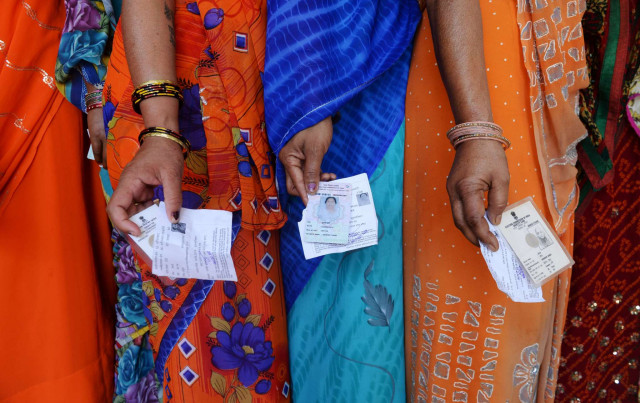Key dates in India's record-breaking election marathon
Voting in the world's biggest democratic exercise wraps up today.

Women stand in line to cast their vote during the 2014 general elections in India. PHOTO: AFP/FILE
The following are some of the key dates in the contest which is expected to bring the Hindu nationalist opposition leader Narendra Modi to power:
March 5: Chief Election Commissioner VS Sampath announces that elections to the 543-member parliament will begin on April 7, with the results to be announced nearly six weeks later. Some 814 million adults will be eligible to vote, 100 million more than last time in 2009.
March 11: Maoist rebels opposed to the elections kill 16 people in a massive attack on security forces in the central state of Chhattisgarh.
April 7: The election gets underway with voters in six remote northeastern constituencies going to the polls, mostly in the tea-growing state of Assam.
April 9: Opposition leader Narendra Modi acknowledges for the first time that he is married in an election affidavit. His brother later confirms that Modi was betrothed to a now-retired teacher when they were teenagers.
April 10: Voting takes place in the capital New Delhi on the first major day of the contest.
April 24: Modi draws massive crowds in Varanasi as he files his nomination papers to stand in the holy city on the banks of the Ganges. His challengers include anti-corruption champion Arvind Kejriwal.
May 7: Rahul Gandhi, the frontman of the ruling Congress party, tries to rally supporters by touring booths as voting takes place in his Amethi constituency.
May 12: Final day of the election, with voting taking place in the northern and eastern states of Uttar Pradesh, Bihar and West Bengal.
May 16: Counting due to begin with the final results expected later in the day. Although Modi's Bharatiya Janata Party (BJP) is expected to win the most seats, no single party is expected to win an outright majority.



















COMMENTS
Comments are moderated and generally will be posted if they are on-topic and not abusive.
For more information, please see our Comments FAQ